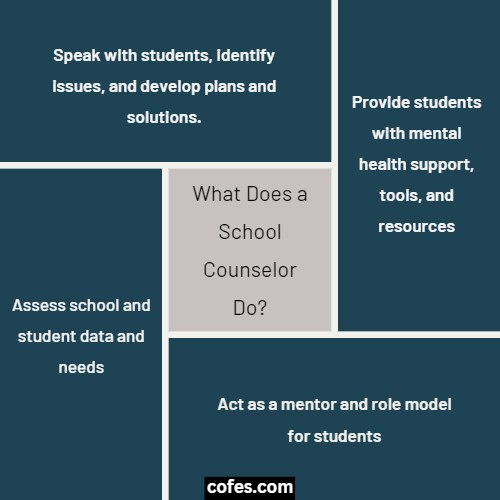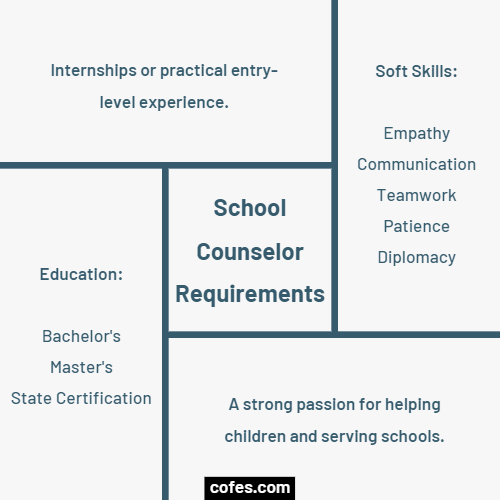School Counselors: A Guide To Understanding To Role They Play In Student’s Lives
School Counselors act as advisors to students and assist them in achieving their full potential personally and academically.
School, especially high school, can be very stressful for students.
School counseling can be an excellent career for people who want to work with young adults and make a difference in their communities.
This career requires a lot of patience and emotional intelligence.
School, life, and societal pressures can be a lot for any young adult, making them act out.
School counselors look for the best in the students they advise and guide them onto a healthy and fulfilling path.
They are often heavily involved in students’ lives and work with parents and teachers to ensure the success of their students.
School Counselor Information
| Official Job Title | School Counselor |
| Average Salary | $60,510 |
| Stress Level | Average |
| Work/Life | High |
| Job Satisfaction | High |
| Career Advancement | Low |
School Counselor Job Description
What Is a School Counselor?
School counselors assist students in reaching their fullest potential academically, socially, and personally.
They listen to the problems of students, suggest solutions, and support students through difficult times.
They also act as well-being facilitators.
It is common for school counselors to be actively involved in a school’s extracurricular activities.
They work with parents and teachers to create strategies that can help students thrive.
School counselors are role models for students and must know how to build trust with the students they mentor so students feel comfortable talking about their issues.

What Does A School Counselor Do Daily?
Daily, school counselors will attend several scheduled meetings with students, parents, and school staff to discuss individual students, analyze processes and facilitate peer programs.
School counselors also act as the go-to resource for prospective parents and students with specific concerns regarding mental health, special needs, and additional support programs.
School Counselors also spend a considerable amount of time educating themselves on emerging trends with teens and new ways to improve their approach to student mentorship.
Responsibilities, Duties & Roles Of A School Counselor
Here is an overview of the roles and responsibilities of a school counselor:
- Speak with students, identify problems, and develop a plan with the student to address them
- Collaborate with parents and teachers to create a strategy that provides the support the student needs
- Build strong relationships with students and act as a confidant
- Provide students with mental health support, tools, and resources that can help a student thrive.
- Intervene in stressful situations that could put the student at risk
- Assist students in finding a career path that is best suited to their skills and talents.
- Act as liaison between students and college recruiters
- Act as a mentor and role model for students
- Facilitate well-being programs for students
School Counselor Salary
Average Salary
According to Salary.com, the average salary for a School Counselor in the U.S. is $60,510.
Starting Salary
According to Salary.com, the starting salary for a School Counselor in the U.S. is $47,390.
Senior Salary
According to Salary.com – After several years of experience, most senior-level School Counselors in the U.S. make $77,210.
How To Become A School Counselor?
The Entry Level: Certification, Training & Degree
All School Counseling positions require a bachelor’s degree, ideally in education, psychology, or sociology.
Most states require school counselors to hold a master’s degree.
The academic requirements for this job illustrate just how important it is to have the knowledge and expertise needed to help students succeed.
Other Skill Sets, Requirements & Qualifications
Being an excellent school counselor requires a large number of soft skills.
Soft skills are personal attributes that enable someone to interact effectively and harmoniously with others.
Soft skills that you will need in this position include flexibility, teamwork, and empathy.
Emotional Intelligence (EQ) is critical in this position and any position working with minors.
It is common to have sensitive information revealed to you that you could find triggering.
This position requires you to be objective and inclusive of the diversity of students you could be serving.
The job is not repetitive as issues and problems for each student.
Every student responds differently to your communication style.
You will need to keep this in mind and adjust your methods accordingly.
Some states, countries, and organizations require a Master’s Degree in a related field.
It may be beneficial to pursue additional certifications such as Mental Health First Aid to serve students better.
How Long Does It Take To Become A School Counselor
Becoming a school counselor takes a minimum of 4 years.
However, it can take up to 6-8 years to complete the education you will need to fill this position.
Is It Hard To Become A School Counselor?
Yes.
Becoming a school counselor requires extensive training and often requires you to take on additional unpaid responsibilities for a school, such as coaching team sports and participating in school events for students.
Being a school counselor also requires a lot of patience and emotional intelligence.
Any person who has worked with children can echo this.
School Counselor Career Paths
The School Counselor Roadmap

First, you must earn a bachelor’s degree in education, psychology, or sociology.
Since most states require school counselors to hold a master’s degree – it is common to pursue a master’s degree immediately after.
It is common during this time for aspiring counselors to take on internships or summer positions in their field to build experience.
Upon graduating from a university, school counselors may be subject to several tests and may need to pursue additional certifications that allow them to work with children.
Projections For Growth In School Counselor Jobs
Jobs in School and Career counseling will grow by 10% through 2031, faster than the average of other occupations.
However, with the increase in online schooling – job opportunities may be even higher.
In Summary: Is School Counselling A Good Career?
School Counselling is an excellent career for those who love working with kids and enjoy social services.
Some significant advantages come with this career, such as long summer vacations and flexible working hours.
Working Conditions
Can A School Counselor Work Remotely From Home?
Yes, it’s possible for school counselors to work from home.
How Many Hours Does A School Counselor Work?
Most school counselors work full-time during the school year (September through June).
However, it is common for School Counselors not to work during the summer months.
However, there are summer positions for school counselors if they wish to work full-time throughout the year.
Can A School Counselor Work Part-Time?
No.
Typically, there is only a small number of school counselors per school.
It is uncommon for school counselors to work part-time due to the nature of their work and the number of students they must be available to help at any given time.
What Are The Average Vacation Days Of A School Counselor?
According to LearningPath, school counselors only work nine months out of the year and have summers off.
Depending on the organization you are in, in some cases, you could receive paid off for the entire three months.
Alternative Careers & Similar Jobs to a School Counselor
- Camp Counselor
- Mental Health Counselor
- Financial Counselor
- Cardiovascular Technologist
- Chemical Dependency Counselor Assistant
- Case Manager
- Physical Therapy Assistant
- Medical And Health Service Manager
School Counselor Resume Tips
If you are applying for a job in School Counseling, be sure to include any experience you have working with children.
You should also highlight volunteer work for the community and minorities.
The LGBTQ community is a great way to show employers that you are well-informed and work well with marginalized groups.
School Counselor Interview Questions
Q1: Why did you choose to become a school counselor?
Why It Works: The Hiring Manager asks you this because they want to know your “Why.”
They are looking to understand better what part of the job you find to be most fulfilling and what drives you in this career.
Q2: Tell me about a successful case you handled in the past.
Why It Works: The hiring manager is looking at how you address difficult situations and wants to see if you have enough relevant hands-on experience to handle the job.
Q3: What is your greatest weakness?
Why It Works: Hiring managers ask this to see if you are self-aware and are testing your ability to navigate difficult conversations.
Jobs Related To School Counselor
- School Psychologist
- Social Worker
- Mental Health Counselor
- Public Health Educator
- Substance Abuse Counselor
- Student Success Specialist
For HR Managers: Tips For Hiring A School Counselor
Key Characteristics To Look For In A School Counselor
- Ability To Work Objectively:
- School counselors serve a diverse range of students, and they must have the ability not to hold prejudice toward others.
- Strong Interpersonal Skills:
- School counselors must be approachable and relatable.
- It can be very intimidating for students to speak up and ask for help when they need it.
- Strong Communication Skills:
- School counselors must have the ability to tailor their delivery of information to their target audience.
- Possessing the ability to communicate complex data respectfully and tactfully is critical.
- Emotional Intelligence:
- School counselors will often find themselves in situations where sensitive information is revealed to them that they could find triggering.
Minimum Level of Education & Experience
School counselors must hold a bachelor’s degree at the very least.
Most states require school counselors to hold a master’s degree.
School counselors should also have experience working with children.
School counselors have the patience and emotional intelligence to be their best for the students they advise and mentor.
